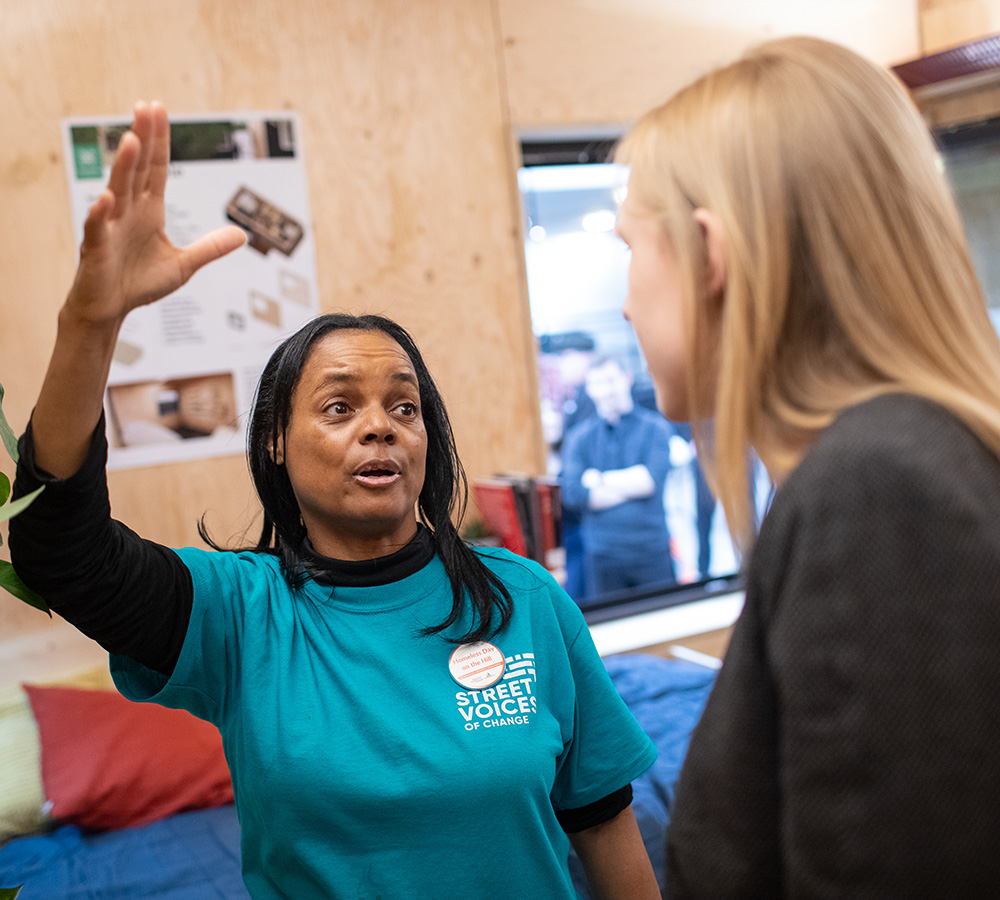Continuous Improvement of Envision
Our plans include the rigorous study of Envision during our 2-year demonstration period so that we can learn from our experience and continuously improve Envision through frequent iteration.

Unique Approach to Research
Traditional research on homelessness is performed by researchers and other professionals who have never experienced homelessness. This traditional research seeks the input of people with lived experience of homelessness viewing those individuals as sources of data, but people with lived experience of homelessness are rarely viewed as potential researchers and scientists. In fact, the research process itself – forming a research question, making hypotheses, designing and analyzing a study – is usually carried out by researchers or other professionals, excluding the true experts on homelessness: people with lived experience of homelessness. Equity in research is as much about the process as it is about the product it creates.

Unique Approach to Research
Traditional research on homelessness is performed by researchers and other professionals who have never experienced homelessness. This traditional research seeks the input of people with lived experience of homelessness viewing those individuals as sources of data, but people with lived experience of homelessness are rarely viewed as potential researchers and scientists. In fact, the research process itself – forming a research question, making hypotheses, designing and analyzing a study – is usually carried out by researchers or other professionals, excluding the true experts on homelessness: people with lived experience of homelessness. Equity in research is as much about the process as it is about the product it creates.
“The route we take when researching homelessness is equally important as the results we report.”
–Stuart Grande, PhD, Envision Researcher
Formal Evaluation of Envision’s Demonstration Project
We have labeled the first two years after Envision opens a “demonstration period” to emphasize that our primary goal during this time is to learn from our experience and make improvements. We know it is critical to learn and make improvements because we want to build communities throughout the state of Minnesota and country, anywhere people would like to live more affordably and surrounded by people with lived experience of homelessness. To scale Envision and build many more units, we need to understand what makes Envision work.
Here is the draft of Envision’s evaluation plan called “Measuring the Impact of Envision Community.” Our evaluation plan is a work in progress, constantly improving as we receive feedback and learn more. Please review our measurement plan and give us your thoughts about how to make it better.
To learn more about the CBPR component of Envision’s evaluation, read the document: “Proposal for Longitudinal Program Evaluation of Envision Community.” Again, this is a draft for community review and we welcome comments to make our evaluation plan better.
A Particular Focus on Health
It is no secret that homelessness severely impacts health. In some climates, homelessness can cut an individual’s life expectancy almost in half (Condon & McDermitt, 2014). New models view housing as a health intervention with an expected outcome of improved health for those who enter stable housing. However, there is no established framework to measure the success of housing as a health intervention, leaving communities and healthcare systems uncertain about where they should invest their limited resources. Our research team is especially dedicated to investigating Envision as a health intervention. Envision is uniquely positioned to integrate stakeholder perspectives from across our community during our evaluation – and most importantly – centering the perspective of people with lived experience of homelessness by serving as the researchers themselves in measuring the health impact of Envision Community. This is totally unique in the scientific research world.
Maximizing Health Impact
The opportunity to improve the health of people experiencing homelessness is real and that opportunity will create healthcare savings that could then be used to pay for housing. Our group explored these concepts in our report: Healthcare Financed Housing, Setting the price point for Envision Community. But the health impact Envision Community achieves depends largely on who we select as residents – especially the 20% of Envision residents who have complex health needs. Optum’s Pro Bono Consulting Corporate Social Responsibility Team assisted Envision in exploring ways to select who will have maximal health benefits from Envision Community. To learn their findings and recommendations for Envision, please read: Selecting the highest utilizers of health care to live at Envision Community. While it is still too early in Envision’s development to finalize the selection criteria for the 20% of residents with complex health needs, Envision’s Research group is committed to learning more about how the selection process influences the health impact of Envision. We remain committed to this line of research because if we can reliably predict the health benefit and healthcare savings created by Envision Community, health plans may want to help pay for housing at Envision to realize those benefits for their members and their organization. This would represent a new source of funding for Envision and with new lines of funding come more opportunities to expand Envision Community and house even more people.
Building Our Research Capacity
Before Envision is built, we are developing the skills necessary to work as an effective research team to perform formal outcomes research. The University of Minnesota’s Center for Urban and Regional Affairs (CURA) generously funded Envision’s first research study to investigate our community’s response to our fully built prototype unit. This research will help us understand what a broad group of people experiencing homelessness think about our prototype unit. The co-created evaluation plan will produce the metrics we need to measure the unit’s success and identify how well our prototype works socially, environmentally, and operationally. During the study, we will formulate research questions, generate hypotheses, design research methods, applying for Internal Review Board (IRB) approval, gather data, analyze the results, and report our findings. The Envision Research Group is carrying out this study and we look forward to sharing our findings.
Continuous Improvement Using Human Centered Design
The formal outcomes research described above will tell us whether Envision worked according to plan and this data might suggest ways improve, but the method of Human Centered Design (HCD) allows us to rapidly test those new ideas for improvement, see which ideas should be carried out more broadly and undergo formal CBPR outcomes evaluation. The HCD process guides design teams through repeating cycles of problem definition, prototyping or testing a potential solution, examining the successes and failures of these small tests to further define the problem, and then diving into a new prototype to test new aspects of the problem. This prototype mindset is essential to HCD because prototypes provide a tangible way for the Envision team to test potential solutions and help the entire Envision collaborative achieve a deeper understanding of the problem we face when trying to build truly affordable supportive communities. This process results in a more effective and less expensive process that doesn’t concentrate resources in the upfront creation of an untested solution, but rather allows teams to invest few resources up front and increase resources as their confidence in the solution grows through successful testing. The Envision team has performed many HCD cycles of problem defining, prototyping, and reflecting on what is learned to further define the problem and plans to continue this HCD process as it seeks to continually improve.
Our Long-Term Goal
Although we are focused on building a ready-to-use process to evaluate and continuously improve Envision during its 2-year demonstration, over the long term we intend to carry these skills far beyond Envision. First, we seek to become our community’s review board – like a community IRB – for all studies about homelessness, ensuring the dignity of that research and giving voice to the people who are subjects in these studies. Second, we seek to perform our own research about homelessness. We want to be known for authentic research grounded in the lived experience of our leaders maintaining constant awareness that research outcomes have real consequences for people experiencing homelessness. Third, we plan to become a valuable resource for any project in our community seeking to research issues or design solutions that address issues the homeless face. Finally, we hope to become a model for other homeless communities around the country to organize and lead research in their community that advances equity for people experiencing homelessness.
To reach our long-term goals, we seek to expand the capacity of research leaders with lived experience of homelessness and learn how our community could use their research expertise. Specifically, we want to answer several key questions:
- What knowledge and skills do research leaders with lived experience of homelessness need to lead research on homelessness?
- What research professionals and staff most effectively support leaders with lived experience of homelessness?
- What outcomes matter to the homeless community? What health and housing outcomes matter most?
- How does a research process led by people with lived experience of homelessness actively promote and empower the broader homeless community?
- What market is available for this research team?
If you are interested in exploring these questions and helping us achieve our research goals, please contact us and join Envision’s Research Group.

